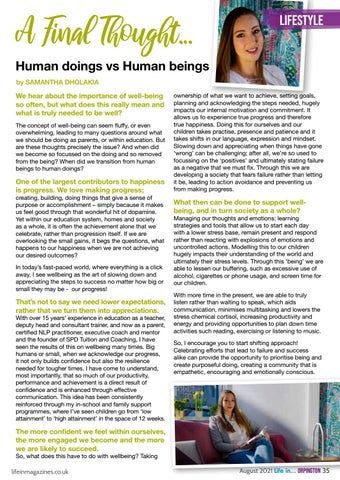A Final Thought…
lifestyle
Human doings vs Human beings by SAMANTHA DHOLAKIA
We hear about the importance of well-being so often, but what does this really mean and what is truly needed to be well? The concept of well-being can seem fluffy, or even overwhelming, leading to many questions around what we should be doing as parents, or within education. But are these thoughts precisely the issue? And when did we become so focussed on the doing and so removed from the being? When did we transition from human beings to human doings?
One of the largest contributors to happiness is progress. We love making progress; creating, building, doing things that give a sense of purpose or accomplishment – simply because it makes us feel good through that wonderful hit of dopamine. Yet within our education system, homes and society as a whole, it is often the achievement alone that we celebrate, rather than progression itself. If we are overlooking the small gains, it begs the questions, what happens to our happiness when we are not achieving our desired outcomes? In today’s fast-paced world, where everything is a click away, I see wellbeing as the art of slowing down and appreciating the steps to success no matter how big or small they may be - our progress!
That’s not to say we need lower expectations, rather that we turn them into appreciations. With over 15 years’ experience in education as a teacher, deputy head and consultant trainer, and now as a parent, certified NLP practitioner, executive coach and mentor and the founder of SPD Tuition and Coaching, I have seen the results of this on wellbeing many times. Big humans or small, when we acknowledge our progress, it not only builds confidence but also the resilience needed for tougher times. I have come to understand, most importantly, that so much of our productivity, performance and achievement is a direct result of confidence and is enhanced through effective communication. This idea has been consistently reinforced through my in-school and family support programmes, where I’ve seen children go from ‘low attainment’ to ‘high attainment’ in the space of 12 weeks.
ownership of what we want to achieve, setting goals, planning and acknowledging the steps needed, hugely impacts our internal motivation and commitment. It allows us to experience true progress and therefore true happiness. Doing this for ourselves and our children takes practise, presence and patience and it takes shifts in our language, expression and mindset. Slowing down and appreciating when things have gone ‘wrong’ can be challenging; after all, we’re so used to focussing on the ‘positives’ and ultimately stating failure as a negative that we must fix. Through this we are developing a society that fears failure rather than letting it be, leading to action avoidance and preventing us from making progress.
What then can be done to support wellbeing, and in turn society as a whole?
Managing our thoughts and emotions: learning strategies and tools that allow us to start each day with a lower stress base, remain present and respond rather than reacting with explosions of emotions and uncontrolled actions. Modelling this to our children hugely impacts their understanding of the world and ultimately their stress levels. Through this ‘being’ we are able to lessen our buffering, such as excessive use of alcohol, cigarettes or phone usage, and screen time for our children. With more time in the present, we are able to truly listen rather than waiting to speak, which aids communication, minimises multitasking and lowers the stress chemical cortisol, increasing productivity and energy and providing opportunities to plan down time activities such reading, exercising or listening to music. So, I encourage you to start shifting approach! Celebrating efforts that lead to failure and success alike can provide the opportunity to prioritise being and create purposeful doing, creating a community that is empathetic, encouraging and emotionally conscious.
The more confident we feel within ourselves, the more engaged we become and the more we are likely to succeed. So, what does this have to do with wellbeing? Taking
lifeinmagazines.co.uk
August 2021 Life in... Orpington 35
